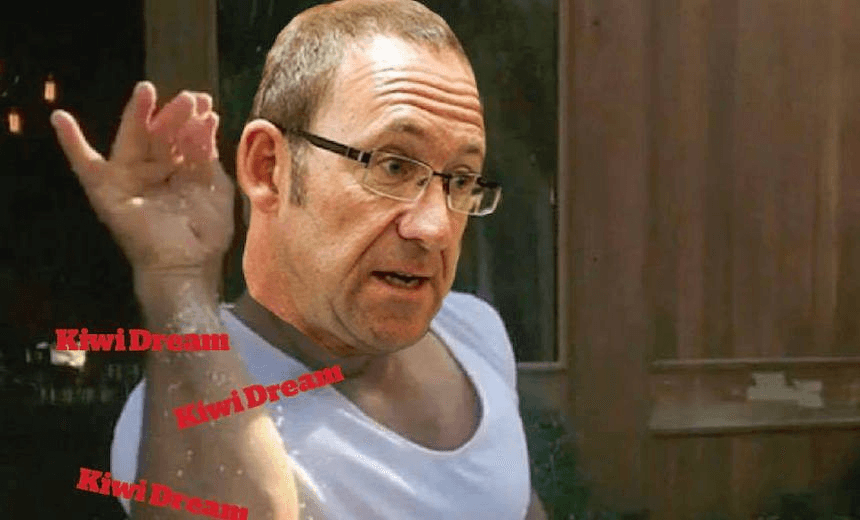Political internet memes played a controversial role in the US election and now they’re taking hold here, just in time for the election campaign. Carys Goodwin reports on the rise of meme warfare in New Zealand.
The NZ election campaign is under way, and Andrew Little is bae, according to this:
We’ll return to the Backing the Kiwi Meme page in a moment but, first, a quick history.
Since the dawn of internet time, the online sphere has doubled as a political battleground. From the use of Twitter to galvanise social movements, to the lengthy discussion threads scattered across political subreddits, to the recent but more subversive use of fake social media accounts to drum up faux support for the alt-right in the upcoming French elections, the internet is where much of modern political discourse is born.
There is no more acute an example of the way politics saturates every facet of our internet life than in the transformation of the humble meme into a vehicle for ironic and amusing (or not) hot takes.
Political memes are not new. Australia, for example, has been a hotbed of meme-creation for a while now, and there was a bizarre instance of Pepe the Frog being developed into an alt-right symbol. In fact, I’d argue memes formed the backbone of the satirical interpretation of the entire US election – examples include ‘Ted Cruz is the Zodiac Killer’ and the popular ‘Bernie v Hillary’ meme format).
It is only recently, however, that the political meme has become relevant in Aotearoa. With the emergence of the Facebook pages Backing the Kiwi Meme and Freshly Picked Green Memes a new political battleground has emerged. While the election campaign is only just beginning, it seems possible that the age of the blogger has been and gone; election 2017 is the age of the meme.
One of the most remarkable things about the past few years in politics is how persistent Labour’s unpopularity has been, struggling to break out of the 20% range and cycling through leaders so quickly they blur together into one amorphous white man. It is even more remarkable, therefore, that the most popular meme page is a Labour one.
Backing the Kiwi Meme, with almost 2,300 likes at the time of writing, is a play on the Labour slogan “Backing the Kiwi Dream”. It focuses on combining current meme trends with pro-Labour, anti-Government themes. These memes can be clever, sometimes anti-Labour-establishment, and are always aiming to be topical.
I spoke to the page’s anonymous founders to get into the mind of the memer. They’re young Labour members, and there are a fair few of them (at least I think so – when I asked, I was told “it takes a village to make a meme”). They haven’t had any response to their page from Labour staffers but they say party leader Andrew Little is welcome to “slide into their DMs whenever”.
“A good meme is a relatable one, where you look at it and say ‘yeah, fuck, too real’,” says a spokesperson. “We try to connect a current news story to a current dank meme, and that crossover works well. The memeiverse spins quickly – you’ve got to jump onto a meme while it’s still fresh and dank.”
While Backing the Kiwi Meme can be vicious, the Green Party-backing Freshly Picked Green Memes specialises in the sweetly absurd. A meme ought to be “humorous, not overly nasty, and able to be easily understood within three seconds tops,” according to page’s two anonymous founders.
Like their Labour-supporting co-memers, they haven’t had any official contact with the Greens, but they’re both members. They say that being one step removed from the party machinery is what gives them an edge.
“If a political party tries using memes it will most likely backfire, losing them support. The best method is through an independent meme page, run by young people who aren’t forced to toe a party line. That gives the memes authenticity.”
What they allude to is the inherent anti-mainstream nature of the meme. While a good meme will proliferate far and wide, crossing between Twitter, Tumblr, Instagram, Facebook and Reddit, it also has a life cycle, a point at which, by common consent, it is no longer cool. Often this is when a group that represents those in power – corporations, political parties, the police – attempt to co-opt it. The result is usually incorrect and cringey.
With the two dominant meme pages largely on the same team, the Aotearoa political meme battleground takes on a particularly subversive quality. The memes are about anger at the system, changing the government, raging at the neoliberal political agenda.
“Nothing is a magic bullet, and our goal isn’t to make all the yoof vote because of one spicy meme page,” notes Backing the Kiwi Meme. “But if someone sees our meme and clicks on an ‘enrol to vote’ link, or joins the party, or just understands a political issue from a different perspective then we’ll be stoked.
“Mostly we’re just here for the lols.”
Of course, there are also memes that represent other ends of the political spectrum. Facebook boasts National, Winston Peters, and Peter Dunne meme pages but they are thin in both content and audience, with likes only in the 50-100 range. To be honest, I’m surprised there are folks out there sufficiently passionate about Winston and Peter to follow their Facebook meme pages, let alone run them, so I’ll give them a pass.
There’s no popular National meme page, but there doesn’t need to be: the official NZ Young Nats page, a veritable overlord of young political Facebook pages with almost 21,500 likes, has been known to dabble in a meme or two itself. I suspect that any young go-getter considering going rogue with a side-Nat meme page risks attracting the ire of the powerhouse Young Nat brand.
If the official NZ Young Nat page tossed its sensible-square-graphic-with-a-faded-blue-background-and-italicised-text aside, and instead stepped up to the plate with real intent and ferocity, the meme battleground could grow, and maybe transform.
The big question is: will this change the shape of the election? The answer, of course, is no. Just as the blogosphere did literally nothing except get Twitter weirdly into blogging last election, I highly doubt the memes will do anything except get young political Facebook weirdly into incredibly specific policy-based memes. But at least they might give us some fleeting entertainment along the way.





